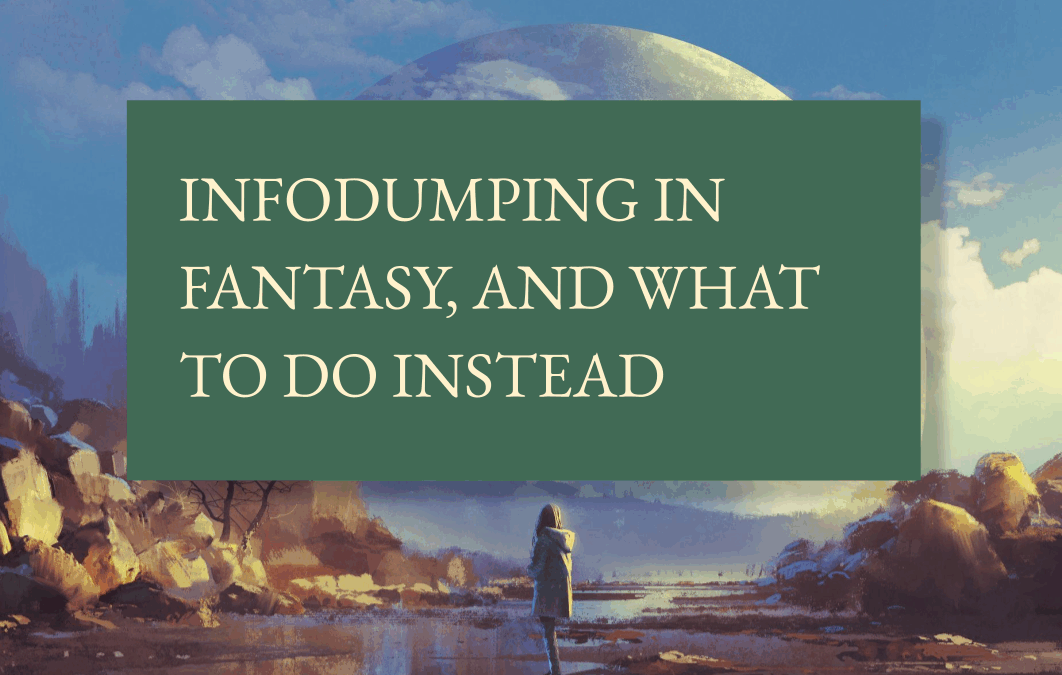You’ve got a lot of ideas. We get it. You’ve built up this incredible, detailed world with a rich mythology, complex geopolitical situation, innovative magic system, a calendar full of festivals, and a unique method of making soft cheese.
You want to tell the reader about it right now. After all, if they don’t know about the legend of the Blood Dragon Wars and the reunification of the Y’lathian City States, how on earth will they understand what’s going on?
But here’s the thing: they’ve already put down the book.
What is infodumping?
Infodumping is when you bombard the reader with background, lore, or history – all the world-building details – at once.
This can take the form of a massive prologue, long rambling speeches, or (may the gods forbid!) just a dry list of facts about the setting.
Now, worldbuilding is incredibly important. People read fantasy because they enjoy a richly detailed setting they can escape into. But everything at once is a lot for a reader to take in. When you read something like that, it feels overwhelming – more like a meeting briefing or exam revision than an enjoyable novel. Every part of your book should be fun to read. None of it should feel like a queue for an amusement-park ride.
An important note here: this can definitely be a Draft 2 or Draft 3 issue. Don’t try to fix this problem in the first draft; just focus on getting the thing written. If you have a work-in-progress and you’re thinking, ‘Oh flip, I’m doing that!’, please don’t worry. It’s a relatively easy fix.
What does the reader need to know?
Ask yourself this: what is absolutely vital for the reader to know in order to keep engaging with the plot?
If you’re giving the reader a bunch of information, think about each fact you’re telling them and then ask, ‘Will the rest of this chapter make sense without it?’
If the answer is no, you can keep it. If the answer is yes, cut it out, stick it in a Word doc, and add it in later.
Description is vital – that’s how the reader paints the picture in their mind – but the temptation to ramble and tell your reader absolutely-everything-about-this-because-it’s-so-cool-trust-me-you’ll-love-it-hey-where’d-you-go is going to be there. Again, I completely sympathise. You’re a fantasy writer; by definition, you have a great imagination, and you want to share it.
Here’s a fast-and-loose rule: limit yourself to three things.
Let’s say you’re describing a town your protagonist is travelling to. What are the three most important and relevant things about it? It probably doesn’t matter that they have a biannual corn festival. Instead, maybe your description includes the following facts:
- Next to the river
- Wealthy – from the trade that comes by the river flowing through the town
- Hosts rival thieves’ guilds – attracted by the town’s wealth
These are all important things that will affect the plot. If there is a corn festival going on, then something needs to happen there to make it worth including (I don’t know, maybe some kind of corn golem goes crazy and kills a bunch of people?). Otherwise, leave it out.
If you can, though, there are better ways to get the information to the reader than plain description.
Better techniques for introducing your world
Like wrapping a worming tablet in a piece of cheese, there are ways to get the information to the reader without infodumping.
1. Show, don’t tell
Yeah, I know – this is a massive cliché. But going back to our example of the town by the river: rather than just saying ‘This town is rich,’ show what a wealthy town looks like. Use a couple of broad strokes that will convey to the reader that this place has money.
On her way into town, the protagonist rides past houses with fine glass windows, while a fat merchant and his wife examine a bolt of deep-blue cloth. The smell of roasting meats and fresh straw comes from the inn.
2. The ignorant stranger
Facts are best shown, not told, as above. But for more abstract things – such as a political system or an unusual tradition – it can help to have someone to talk it through with.
The Ignorant Stranger is a dramatic technique where one character doesn’t know what’s going on because they’re new in town, and another character brings them up to speed (and, conveniently, us as the audience at the same time). A good example is Mr Fag and Thomas from Sheridan’s The Rivals.
The trick is to make sure it comes up naturally in conversation. No one is going to just go up to their mate and say, ‘So, tell me about the political situation in the country we live in.’ Instead, be driven by the plot.
Let’s go back to the town example. Suppose our protagonist has a companion who has never been there before. They might express their enthusiasm for visiting somewhere new, only for our protagonist to warn them why they should keep a hand on their purse.
3. Wise old mentors
The classic example is Luke Skywalker finding out about the Force from Obi-Wan.
It doesn’t just have to be Wise Old Mentors; your protagonist (and the readers) can be given information by any patron or authority figure as part of a briefing or induction. Training montages work well too. If you want to explain how your magic system works, have someone learning to cast magic taught by an expert.
This type of exposition helps a reader feel ‘in on it’, as they’re learning alongside your protagonist and feel connected to their journey.
What to do in your opening instead
Infodumping most often happens in the first chapter. So if we’re not infodumping, what should we be doing?
Character, flavour, and action.
Spend those valuable first pages hooking the reader. These are the pages that will make them decide whether to buy your book.
Character
Introduce a protagonist your reader will want to hear more about. This is your leading man – the poster child for your book, the guy they’re going to argue was miscast for the Netflix series (okay, maybe getting ahead of ourselves, but you take my point). This is their big entrance. Give them space to be interesting; don’t crowd them with needless facts about the setting.
Flavour
By the end of the first couple of pages, the reader needs to know what type of book they’re reading. Don’t be coy – if it’s a cosy fantasy romance or a grimdark slaughterfest, own it! The flavour of the book doesn’t depend on setting specifics or minutiae. Rather, those details contribute to and reinforce the flavour later on.
Action
Don’t talk about all the interesting stuff that happened ages before the story is set. Do cool stuff now. Get your reader hooked by throwing your protagonist into it from the start.
Jack Shannon is a massive nerd. He’s also the author of Brigandine, a Grimdark fantasy novel full of swords, bloodshed, and Lovecraftian horrors. If you like your books sweary, bloody, and just a bit funny, why not give it a read?
Do you write fantasy or science fiction?
Join our email list for regular writing tips, resources, and promotions.

